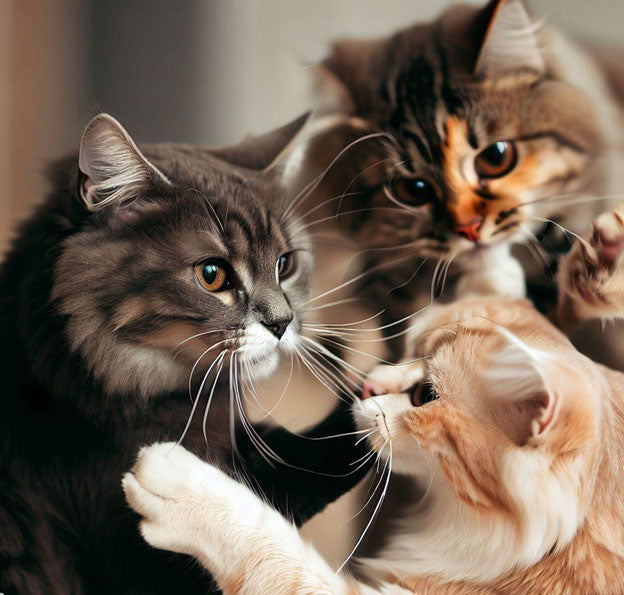
7 Reasons Why Your Cat is Sneezing
Disclaimer: Some of the links in our blog posts are affiliate links. This means we may earn a small commission if you make a purchase through them which helps support our blog, at no extra cost to you.
Are you wondering why my cat is sneezing a lot? Don't worry. You're not alone in the land of puzzled pet parents! It's like your cat is trying to become the world's tiniest trumpet player, serenading you with their symphony of sneezes. But before you start considering a career in cat comedy, let's explore the world of whiskers and figure out why your kitty is channeling their inner sneeze master! Remember, if all else fails, tell your cat to cover their nose when they sneeze as any polite feline would.
Why Is My Cat Sneezing a Lot?
"Why is my kitten sneezing a lot? Has she/he caught a cat cold?" If this question has you scratching your head, fear not, for we're about to embark on a whimsical journey into the world of feline sneezes! There are several reasons why your cat may be sneezing excessively. It could be due to allergies, infections, foreign objects in the nose, dental problems, or even certain medications. It's important to take note of any other symptoms your cat may be experiencing and consult with a veterinarian if the sneezing persists or worsens.
Why Do Cats Sneeze: Causes
Cats are fascinating creatures known for their grace and enigmatic nature. However, when a cat suddenly sneezes, it can leave us puzzled. Although it may seem amusing or cute, sneezing in cats is a natural physiological response with various potential causes. These causes range from allergies to infections and environmental irritants to dental issues. To get the answer to Why is my cat sneezing, you must first discover the underlying cause.
1. Smells
Did you know that your cat could be a perfume critic? Yes, you heard it right! If you've recently applied perfume or air freshener and your cat starts sneezing, it's probably because they don't like the smell. Your cat might also sneeze in response to other chemical solid odors like air fresheners and paint that they find unpleasant. So, to keep your cat happy, use only the purr-fect fragrance.
2. Upper Respiratory Infection
Cats, just like us, can catch a cold. Feline herpesvirus and calicivirus can turn your furball into a sneezing sensation. Infections can cause your cat to sneeze, usually accompanied by other symptoms. Some common viral infections that can result in sneezing are Feline Herpesvirus type-1 (FVR) and Feline Calicivirus (FCV). At the same time, bacterial infections like Bordetella Bronchiseptica and Chlamydophila Felis can also cause sneezing in cats.
3. Allergic Antics
Cats have their share of allergies. Pollen, dust mites, mold, or even certain gourmet cat foods can trigger sneezing fits as if they're part of a secret kitty conspiracy to keep the tissue industry booming. There are three main types of allergies: insect, food, and environmental.
4. Nasal Nuisances
Imagine your cat as a vigilant detective patrolling its territory with its super-sensitive nose. Strong odors, secondhand smoke, or the lingering scent of that salmon you grilled last night can lead to sneezing showdowns. Curiosity may not always kill the cat, but it can get them into sneezing trouble. Tiny foreign objects like dust, grass, or particles can infiltrate their nasal passages, causing rapid-fire sneezing fits.
5. Dental Issues
It may surprise many pet owners, but dental disease can lead to cat sneezing. Sneezing is often just a symptom of a more serious underlying issue. The upper jaw's tooth root canals are next to the nasal passages. When one or more teeth get infected or inflamed, the wall between the tooth hole and the nasal passage can get damaged. If this condition is not treated in time, bacteria can spread to other body parts.
6. Nasal Growth
In rare cases, nasal polyps or tumors can play hide-and-seek in your cat's nasal passages. These unwelcome guests can obstruct airflow and provoke persistent sneezing as if your cat's nose has become their game of hide-and-sneezes.
7. Cancer
Cancer in cats can sometimes cause sneezing. Look for specific symptoms such as sudden weight loss, loss of appetite, vomiting or diarrhea, abnormal lumps, lethargy, bleeding for no apparent reason, and wounds that are slow to heal. Feline Leukemia Virus (FeLV) can cause cancer in cats.
While your cat's sneezing may provide entertainment, keeping a watchful eye on their health is paramount. If the sneezing persists, especially alongside other concerning symptoms like fever, nasal discharge, or appetite loss, don't hesitate to consult your trusted veterinarian. They'll work their magic to uncover the mysteries behind your cat's sneezing saga and guide your furry friend back to a sneeze-free serenity!

Is your kitty sneezing and rubbing its face on you? Here’s why cats rub their face on humans!
What to Do When Your Cat Sneezes a Lot?
If you notice your beloved feline sneezing, it's important to investigate what could be causing it. Start by observing when the sneezing occurs - is it at a certain time of day or linked to specific locations or activities in your home? Consider any recent changes, such as introducing new cat litter, scented products, or household cleaners, as these environmental factors can trigger sneezing in sensitive cats. Additionally, check the cleanliness of your home, as dust and pollen often play a role in these sneezing bouts. If you suspect an upper respiratory infection, you can help your cat by gently cleaning their nasal discharge, encouraging them to eat, providing fresh water, and using a humidifier for temporary relief until you can schedule a vet appointment. If environmental factors have been ruled out and the sneezing persists, it's time to schedule a professional veterinary evaluation to uncover and address the underlying cause.
Treatment for Cat Sneezing Symptoms
The treatment for your cat's sneezing depends on the cause. First, identify the exact cause and then proceed with the treatment. Sometimes, home remedies and certain lifestyle changes are enough to eliminate constant cat sneezing.
Irritants:
If the problem is due to irritants, try changing cleaning products and keeping your cat out of the room during cleaning.
Allergies:
Consult your vet for allergies. They can prescribe medications for insect and environmental allergies. They may also recommend an elimination test or switching to a hydrolyzed protein-based food for food allergies.
Infections:
Viral infections can only be treated symptomatically, so it is crucial to ensure that your cat has been diagnosed correctly. Bacterial infections, on the other hand, can be treated with antibiotics prescribed by a vet.
Dental Issues:
To help your cat with gingivitis and dental disease, treat the infection and maintain healthy teeth. Your vet will prescribe medication and a diet. Afterwards, brush your cat's teeth or get them cleaned twice a year and give them "dental treats."
Throat Obstruction:
If your cat has ingested a foreign object, immediately call your vet for removal. Depending on the object, X-rays and possibly even surgery may be required.
Cancer:
If cancer has been diagnosed in your cat, your vet can recommend the next steps. Early detection can increase the chances of recovery, and treatment options include surgery, chemotherapy, and radiation therapy.
As a cat parent, you may have experienced worry when your feline friend begins to sneeze frequently. While it's normal to feel concerned, in most cases, sneezing in cats is harmless and can be due to various reasons such as allergies, irritants in the environment, or even infections. However, it's best to consult a veterinarian if you notice other symptoms like discharge from the eyes or nose, lethargy, or loss of appetite. As a cat parent, you can strengthen your bond with your furry friend by considering custom pet gifts and accessories such as personalized mugs, blankets, phone cases, or cat portraits. These unique items can add a special touch to your home decor while celebrating your love for your feline companion.
Popular Blog
7 Unique Products That Every Dog Owner Will Love
Let’s be honest, our dogs run the house. They make us laugh, steal our socks,...
50 Funny Dog Birthday Puns for a Tail-Wagging Good Time!
Here is a delightful collection of 50 dog birthday puns guaranteed to bring s...
Homemade Dog Toys Your Pooch Will Love: Top 10 DIY Delights
Pet toys, especially safe dog toys, can be expensive and don’t last too long....
Canine Companions Worldwide: Modern Treatment & Taxes for Dog Owners
The intricate relationship between humans and dogs is a testament to a profou...











